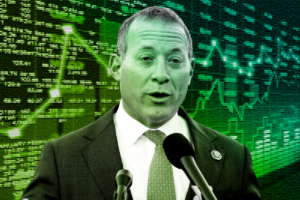The Importance of “Breakthrough” Designation in Drug Policy
What’s good for Pharma isn’t always good for average drug users. Photo: Jenny Ondioline / UNDP Ukraine / CC BY 2.0
This is Part of the "The Ecstasy of Agony" Dig series
Photo: Jenny Ondioline / UNDP Ukraine / CC BY 2.0
This is Part of the "The Ecstasy of Agony" Dig series
A veterans-supported psychedelics bill would temporarily reclassify some drugs from Schedule I to the less restrictive Schedule II, but only until they are approved as pharmaceuticals. Like so much else in the rapidly changing world of psychedelics policy, corporate actors have the most to gain.
Nearly two dozen United States veteran groups — led by the organizations Reason for Hope and the Veteran Mental Health Leadership Coalition — have signed an open letter to Congress supporting a bipartisan initiative known as the Breakthrough Therapies Act. If passed, this act aims to aid research into potential medical therapies by reclassifying Schedule I drugs to Schedule II drugs if they’ve received “Breakthrough Therapy Designation” (BTD) from the Food and Drug Administration (FDA).
“Because MDMA and psilocybin are currently classified as Schedule I drugs, it is nearly impossible to legally access these breakthrough therapies within the United States,” the letter states. “We should not be surprised — but should be highly ashamed — that our veterans are leaving the country they served to seek out these treatments where they can legally do so abroad.”
What is BTD and why is this legislation unique?
A drug receives BTD if it is purported to treat a serious or life-threatening condition, and its preclinical evidence indicates that it may be more effective than other available drugs. The FDA commits to working closely with organizations taking BTD drugs through clinical trials and to expedite research.
Both MDMA (specifically when used in the clinical trials of the Multidisciplinary Association for Psychedelic Studies (MAPS)) and psilocybin (specifically when used in the clinical trials of Compass Pathways and Usona Institute) have received BTD.
Generally, BTD is limited to specific forms of a drug, such as MAPS’ Good Manufacturing Process MDMA or Compass Pathways’ patented psilocybin polymorph, COMP360. But this new legislation would more broadly reclassify “a drug or other substance that is an active moiety or active ingredient (whether in natural or synthetic form) of an investigational new drug” as Schedule II.
This is unique because it opens reclassification from Schedule I to Schedule II to the general substances themselves, not just those drug products that specifically received BTD.
Why is the Breakthrough Therapies Act good for the psychedelic pharmaceutical industry, but not for average drug users?
While it seems exciting that this act could reclassify psychedelic drugs like MDMA and psilocybin to a lower schedule — and it could certainly eliminate research red tape — the details of the legislation seem to benefit the pharmaceutical industry much more than average drug users or victims of the drug war.
First, rescheduling of a drug from Schedule I to Schedule II will not automatically change the penalties for use, possession or trafficking. That would have to be done through the U.S. Sentencing Committee, which has denied revising penalties on drugs like MDMA in the past.
Second, the language of the legislation implies that once a rescheduled drug, like MDMA or psilocybin, makes it through clinical trials and is marketed as a pharmaceutical intervention, other versions of that drug may be reclassified as Schedule I again.
“It’s our understanding that this Act (if passed) may move substances like MDMA and psilocybin to Schedule II only until such a time that a drug (or biological) product that contains such substances is approved,” according to a recent write-up about the legislation by psychedelic industry analyst Psychedelic Alpha. “It would then be likely that the drug product be rescheduled (via processes outside of this Act), but the substance itself remain on Schedule I: a phenomenon referred to as bifurcated scheduling.”
Psychedelic Alpha uses Compass Pathways and its patented polymorph of psilocybin as an example, stating that the Breakthrough Therapies Act would initially see psilocybin broadly rescheduled to Schedule II. But if a drug product such as COMP360 (the form of psilocybin patented by Compass Pathways) is approved, “psilocybin itself could go back to Schedule I (while [patented polymorph] COMP360 is down scheduled).”
In 2019, I wrote about the potential for psychedelic drugs to receive bifurcated scheduling, noting that this has historically happened with other drugs.
GHB, for example, is a Schedule I drug. But if GHB is used in sodium oxybate under an Investigational New Drug (IND) or New Drug Application (NDA) from the FDA, GHB is considered a Schedule III substance with Schedule I trafficking penalties. Another example is Epidiolex, a branded pharmaceutical CBD product, which was reclassified as a Schedule V drug, while non-FDA-approved CBD products remain Schedule I under federal law.
Responding in 2019 to the potential for bifurcated scheduling of psychedelics, former director of communications strategy for the Drug Policy Alliance, Jag Davies, said that medicalizing psychedelics will only guarantee reduction of penalization for people who use them in medically supervised, government-approved facilities.
“There are a lot of drugs that are approved for medical uses, yet still harshly criminalized,” Davies said. “90% of drug enforcement happens at the local and state level, so when it comes to reducing the criminalization of MDMA and psychedelics, that’s where people can have the most impact — working for drug policy reforms locally, such as de-felonizing and decriminalizing drug possession.”
In conclusion, the Breakthrough Therapies Act appears to have the potential to accelerate pharmaceutical trials of psychedelic drugs by eliminating strict research barriers, making it easier to bring psychedelic pharmaceuticals to market. But the act does little for drug users outside of a pharmaceutical research context.
Your support matters…Independent journalism is under threat and overshadowed by heavily funded mainstream media.
You can help level the playing field. Become a member.
Your tax-deductible contribution keeps us digging beneath the headlines to give you thought-provoking, investigative reporting and analysis that unearths what's really happening- without compromise.
Give today to support our courageous, independent journalists.






You need to be a supporter to comment.
There are currently no responses to this article.
Be the first to respond.